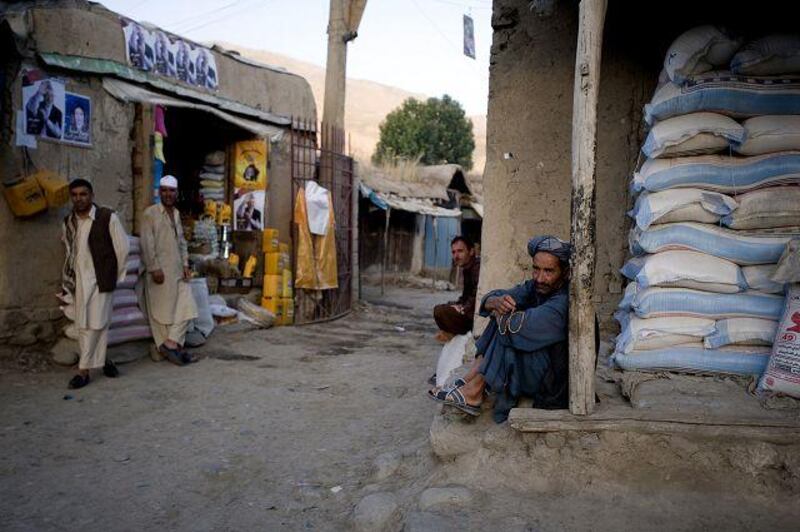KABUL // The campaign chairman for the main rival to President Hamid Karzai in Afghanistan's upcoming elections has warned that his team will actively reject a result that has the incumbent winning. In stark terms with potentially severe implications for the country's future, Abdul Sattar Murad said supporters of Abdullah Abdullah would take part in mass protests if their candidate was not victorious. "We will not accept it. [Mr Karzai] cannot win unless he resorts to large-scale corruption, so we will not accept that. The nation is not voting for him. He only gets votes through his governors and by corruption," he said. Presidential and provincial council elections are due to take place on August 20, at a time when Afghanistan is faced with its worst insurgent violence since the Taliban regime was overthrown almost eight years ago. Mr Karzai is the clear favourite and most observers expect him to triumph, either in the first round of voting or in a runoff soon afterwards. But with the campaign season now in full swing and candidates holding rallies across the country, the gap may be closing. The incumbent's two nearest challengers are Mr Abdullah, a former foreign minister, and Ashraf Ghani Ahmadzai, a former finance minister. Speaking in an interview, Mr Murad gave a clear sign of the tension that is developing with just weeks left to go. And in a city still coming to terms with a recent history of turmoil and bloodshed, his words could have huge significance. Describing Mr Karzai as "a thief", he stated more than once that any victory for the president will be regarded as a fix and Mr Abdullah's supporters would not accept it. "There will be a big demonstration, street demonstrations, and it will turn bad. The country will land in the middle of a crisis," he said. "What we see right now is that Dr Abdullah is going to win. If it's the people's vote and mandate, he is going to win. If it's the governors' and the election commission's mandate and vote, Karzai is going to win." Insults and suspicion are nothing new to the political scene here. Last week, Mr Karzai pulled out of a television debate with his two main challengers, accusing the network hosting it of being biased. Posters of the candidates are plastered in villages, towns and cities throughout the country, often being ripped down or covered up by supporters of other campaigns. But there has as yet been no significant unrest between rival sides. If Mr Murad's warnings are to be believed, that could change. He was the governor of Kapisa province until he was removed from his position in 2007, and he accused Mr Karzai's backers of creating "phantom" voter registration cards in Paktika, Paktia and Logar. The Independent Election Commission of Afghanistan (IEC), he claimed, was directly involved in plans to rig the result. "With Karzai as president, with Dr [Azizullah] Ludin as head of the election commission, zero per cent we are confident [the process will be free and fair]," he said. The IEC was established in accordance with Afghanistan's constitution. It oversaw the presidential election in 2004 and the parliamentary and provincial council elections a year later. International monitors will be present on Aug 20. Noor Mohammad Noor, spokesman for the IEC, called on anyone with proof of fraud to present the evidence to it or the Electoral Complaints Commission. He categorically denied that the IEC is secretly backing Mr Karzai, adding, "the Afghan people believe [in] us". A second round is scheduled to take place if no candidate gets more than half the vote - something Mr Murad insisted would happen only if Mr Karzai "can resort to 50 per cent of [the corruption] he has planned". Otherwise, he said, Mr Abdullah would win at the first time of asking. With the Taliban-led insurgency growing stronger, there are genuine fears that many Afghans will not be able to go safely to the polls. However, so far no official evidence of the kind of widespread fraud he alleges has come to light. The possibility of unrest, though, is on a lot of minds. People across the country have become increasingly frustrated with the government and foreign troops in recent years. Corruption is just one of the reasons for their disenchantment. Haroun Mir, the director of Afghanistan's Centre for Research and Policy Studies, warned "there is a huge risk of violence" breaking out when the results are announced. "If there is a second round then the country will polarise along ethnic lines," he said. From 1992 to 1996, Kabul was torn apart by a civil war between factions of the mujahideen, who had earlier resisted Soviet occupation. A number of the key players in that carnage are now prominent figures in the various election campaigns. "If Abdullah says, 'I don't accept the outcome of the elections', what will happen?" We will not have peaceful demonstrations in Kabul like in Tehran or elsewhere. People will come with their Kalashnikovs. Every single home in Kabul has a gun," Mr Mir said. csands@thenational.ae
Rival warns Karzai win will not be accepted
Supporters of Abdullah Abdullah say they will take to the streets in protest if the president is victorious in the August 20 election.

More from the national





